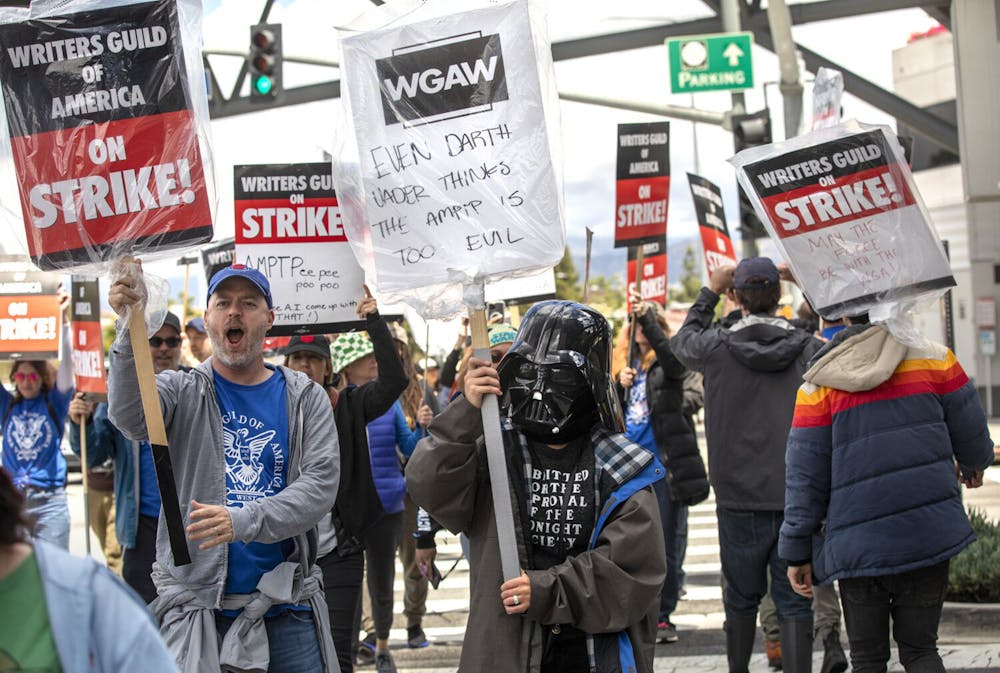In January 2008, in the midst of the Writers Guild of America strike, a catastrophic event occurred: because actor Steve Carrell refused to cross the picket line and film any episodes of “The Office,” NBC was forced to replace that show’s time slot with Donald Trump’s “The Celebrity Apprentice.”
Horrifying, I know. But this was the reality during the last WGA strike, which spanned from the end of 2007 through the beginning of 2008 — right in the middle of the standard television season. Shows like “Breaking Bad,” “30 Rock” and “Lost” were all interrupted due to the strike and, yes, viewers were forced to watch Trump rather than Michael Scott.
It’s 15 years later, the WGA is on strike again and the possibility of our favorite TV shows being affected is looming once more on the horizon. Sounds dire, doesn’t it? I wouldn’t blame you for feeling that way, but I must remind you that a strike is supposed to be disruptive.
Ultimately, what the writers in Hollywood are asking for isn’t even unreasonable — they’re simply wanting to be paid more per episode for streaming series so that their wages might be on par with that they’d get from a longer broadcast series. They’re also asking that the royalties earned on those series be equal.
[Related: OPINION: Labor unions need to make a comeback]
Nevertheless, the Alliance of Motion Picture and Television Producers, representing the major studios, argued for significant compromises and even flat-out rejected many of the WGA’s proposals. The Alliance cited the “long-term health and stability of the industry” as their reasoning for not giving into the WGA’s demands.
But, you know what ensures the industry's long-term stability? Retaining talented writers to help create hit TV shows and movies! But even that seems like too much of a hassle for the studios — one of the proposals the AMPTP rejected was to regulate the use of artificial-intelligence softwares to write scripts.
The use of AI to develop ideas for or even draft scripts can greatly reduce the number of actual writers needed on a movie or show, meaning writers are, once again, subjected to unfair labor practices. If I had the choice between dealing with production delays for my favorite shows or seeing them reduced to a soulless, robot script just to save some money, I’d choose the production delays any day.
Although this strike is a bit different from the last one in that it came at the end of the standard television season, we’ve already seen several shows affected. The most obvious have been the late-night shows: “The Tonight Show,” “Last Week Tonight” and “Jimmy Kimmel Live!,” among others, all went off the air as soon as the strike began.
Other shows, like “Stranger Things” and “The Last of Us,” have seen production delays since the start of the strike. The list is relatively small now — at least compared to 15 years ago — but it’s impossible to tell exactly how long this is going to last. The previous one lasted 100 days, and it’s entirely plausible this one could go on for just as long.
It could even involve other unions, like the Directors Guild of America or the Screen Actors Guild — both of these major Hollywood unions’ contracts are up for renegotiation in June, and they’re asking for many of the same protections as the WGA. The AMPTP already rejected an early proposal from the DGA, meaning it’s possible these two organizations also go on strike this summer.
This could effectively shut down the industry. No directors, actors or writers means even scripts written before the strike aren’t going to be shot. In other words, it would be massively disruptive and the general audience would start to feel the effects very quickly.
[Related: OPINION: There's more to movies than Marvel]
Which is why it’s so easy for viewers to think about the disruption in terms of annoyance — who cares what’s happening behind the scenes, why do we have to wait even longer for the rest of Joel and Ellie’s story?
I get it. It sucks when the shows or movies we’re anticipating and have waited so long for are suddenly pulled out from underneath us. But none of these shows or movies would even exist if it weren’t for an amazingly talented crew of writers who developed or adapted the ideas and then drafted the script. Part of the reason we’re seeing production delays is because showrunners understand the necessity of their writers; instead of crossing the picket line and hiring temporary workers, they’re choosing to put a hold on their own work for the best possible final product.
The industry could be in shambles soon, but maybe it needs to be.
Joey Sills (he/him) is a junior studying journalism and political science.




